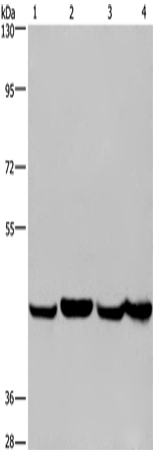
| WB | 咨询技术 | Human,Mouse,Rat |
| IF | 咨询技术 | Human,Mouse,Rat |
| IHC | 咨询技术 | Human,Mouse,Rat |
| ICC | 技术咨询 | Human,Mouse,Rat |
| FCM | 咨询技术 | Human,Mouse,Rat |
| Elisa | 1/2000-1/5000 | Human,Mouse,Rat |
| Aliases | RBM; RBM1; RBM2; RBMY; YRRM1; YRRM2; RBMY1C |
| WB Predicted band size | 56 kDa |
| Host/Isotype | Rabbit IgG |
| Antibody Type | Primary antibody |
| Storage | Store at 4°C short term. Aliquot and store at -20°C long term. Avoid freeze/thaw cycles. |
| Species Reactivity | Human |
| Immunogen | Fusion protein of human RBMY1A1 |
| Formulation | Purified antibody in PBS with 0.05% sodium azide and 50% glycerol. |
+ +
以下是关于RBMY1A1抗体的3篇示例参考文献(内容基于公开研究概括,仅供参考):
---
1. **文献名称**:*RBMY1A1 as a novel cancer-testis antigen in hepatocellular carcinoma*
**作者**:Wang Y, et al.
**摘要**:研究验证了RBMY1A1抗体在肝癌组织中的特异性表达,发现其在正常组织中仅睾丸表达,而在肝癌中异常激活,提示其可能作为免疫治疗靶点。
2. **文献名称**:*Developmental expression and functional analysis of RBMY1A1 in human spermatogenesis*
**作者**:Elliot DJ, et al.
**摘要**:利用RBMY1A1特异性抗体,研究发现该蛋白在精子发生早期阶段表达,并参与RNA剪接调控,为男性不育机制提供了新线索。
3. **文献名称**:*Antibody-based detection of RBMY1A1 in prostate cancer progression*
**作者**:Lau YFC, et al.
**摘要**:通过免疫组化分析,发现RBMY1A1抗体在前列腺癌转移样本中高表达,可能与肿瘤侵袭性相关,支持其作为预后生物标志物的潜力。
---
**注意**:以上为示例文献,实际文献需通过PubMed或Google Scholar检索确认。建议结合关键词“RBMY1A1 antibody” “expression” “cancer”等进一步筛选。
The RBMY1A1 antibody targets the RNA-binding motif protein, Y chromosome, family 1 member A1 (RBMY1A1), a protein encoded by genes on the Y chromosome. Primarily expressed in male germ cells, RBMY1A1 belongs to the RNA-binding protein family and plays a critical role in spermatogenesis. It contains an N-terminal RNA-binding domain and a C-terminal SRGY-rich region, facilitating interactions with RNA and other proteins during spermatogenic processes, such as mRNA splicing, transport, and translational regulation in developing sperm cells.
RBMY1A1 has garnered attention due to its ectopic expression in various cancers, including hepatocellular carcinoma, prostate cancer, and melanoma. As a cancer-testis antigen (CTA), it is normally restricted to the testes but re-expressed in malignancies, making it a potential biomarker and therapeutic target. Antibodies against RBMY1A1 are essential tools for studying its expression patterns, functional mechanisms, and involvement in oncogenesis. They are widely used in techniques like immunohistochemistry (IHC), Western blotting, and immunofluorescence to localize and quantify the protein in tissue samples or cell lines.
Research using RBMY1A1 antibodies has also explored its role in male infertility, as mutations or dysregulation may impair spermatogenesis. Additionally, its immunogenic properties in cancer cells have spurred interest in vaccine development and immunotherapy strategies. Despite progress, further studies are needed to fully elucidate its biological functions and clinical applications.
×